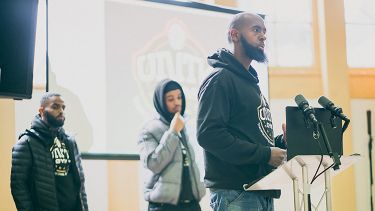- Experts, local charities and youth organisations call for preventative measures to reduce violent crime in Sheffield, such as cutting school exclusions and recruiting more diverse teachers
- Report recommends paid working group of young people and adults from deprived areas to co-design regional violence reduction strategies
- Concerns government investment in public health approach to knife crime is too short-term to be effective
In a report based on a public symposium about youth violence, masculinity and mental health, experts from the University of Sheffield, Unity Gym Project, Sheffield Flourish and the 4Front Project have made 10 recommendations to improve the effectiveness of the city’s approach to preventing and curbing violence.
These include measures to help families in deprived areas to claim benefits and maximise their incomes, reduce the number of school exclusions and make teachers more representative of the communities they serve.
South Yorkshire is among the top five local authority districts ranked according to increases in knife crime, and Sheffield experienced eight fatal stabbings in 2018 – representing only a fraction of offences.
In June 2019, Home Secretary Sajid Javid announced £1.6 million for the South Yorkshire Police and Crime Commissioner to set up a Violence Reduction Unit, based on a successful public health approach to violence in Scotland.
However, experts are concerned that the short term nature of this investment, as well as service fragmentation and poor relationships between state institutions and communities, will limit the plan’s success in Sheffield.
This report represents our collective work with some of the communities most affected by violence. Too often, these groups are not meaningfully included in the development of plans to address the issues that affect them. We hope that these recommendations can contribute towards the development of local responses that take a holistic, collaborative and sustainable approach to achieve a safer city for all.
Dr Will Mason
Lecturer in Applied Social Sciences at the Sheffield Methods Institute
Abtisam Mohamed, Cabinet Member for Education and Skills said: “Reducing school exclusions is one of my key priorities because of the impact it has on a young person's life chances. I am committed to working with partners to recognise the importance of this issue, but more importantly to ensure it is addressed on a long-term basis.”
Temi Mwale, Director of the 4Front Project, said: “As a London-based organisation, we believe that national collaboration is essential and we were delighted to work in partnership with Sheffield organisations to develop regional recommendations that will make a difference.
"We work tirelessly to enable young people to be at the forefront of change because we believe that those with lived experience of violence have a crucial role to play in designing strategies to build peace in our communities. Our recommendations are clear and actionable – we hope that they will be implemented promptly.”
The report recommends the council takes steps such as:
- Support coordinated preventative work across schools, youth services, police, child and family support and mental health, to stop violent crime occurring in the first place, intervene early when it emerges and ensure ongoing violence problems are well managed.
- Work with affected communities to develop a paid working group of young people and adults, responsible for co-designing citywide and regional strategies to reduce violence.
- Work with Sheffield Citizens Advice Bureau and charities to extend the availability of benefits advice and income maximisation support for deprived communities.
- Enhance and support the provision of culturally specific support for those affected by serious violence.
- Develop a strategy to reduce school exclusions, monitored by a scrutiny committee of young people and parents from schools with the highest exclusion rates.
- Sheffield universities should build on existing efforts to support trainee teachers who are underrepresented in Sheffield schools, with clear routes to local employment.
- Local secondary and further education should increase opportunities for young people to learn about employment and work shadowing opportunities and build links between local employers and community organisations.

